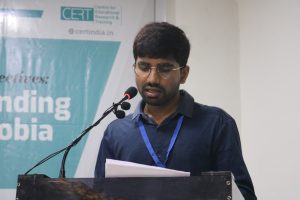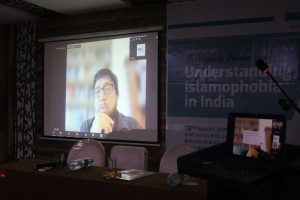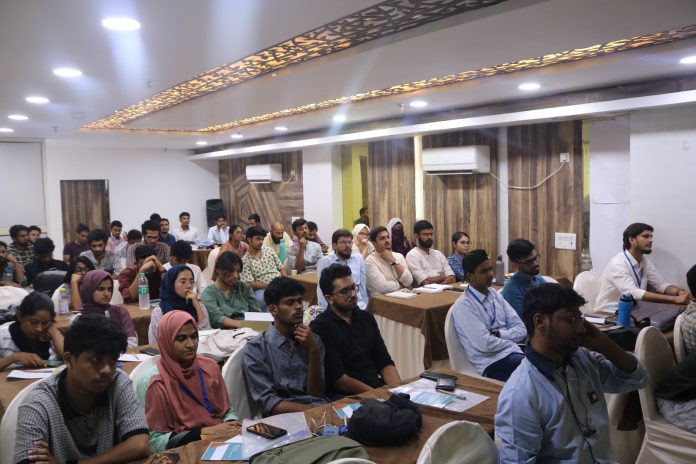– Syed Ahmed Ali
In a significant stride towards understanding and addressing the prevalent issue of Islamophobia in India, the Centre for Educational Research and Training (CERT) hosted a thought-provoking seminar on Sunday, August 13th, 2023. The event, held in Delhi, served as a pivotal platform for in-depth discussions, shedding light on the nuanced layers of Islamophobia within Indian society and educational institutions.

Dr. Roshan Mohiddin, Director CERT, stated that the seminar, meticulously conceptualised and executed, encapsulated the essence of CERT’s ongoing research project on Islamophobia. The project’s core objective is to document and illuminate the experiences of Muslim students within Indian educational institutions, with a specific focus on the gravity and dimensions of narratives perpetuating acts of Islamophobia, discrimination, and prejudice.

The chief guests at the seminar included Prof. Salman Sayyid, a Professor in Rhetoric and Decolonial Thought at the University of Leeds, where he also heads the School of Sociology and Social Policy. His research primarily centres around decolonial political theory, with major publications such as ‘Recalling the Caliphate: Decolonisation and World Order’ (2014) and ‘A Fundamental Fear’ (1997). Also present was Dr. Kawtar Najib, a social and urban geographer with research interests in social inequality and religious discrimination. She utilises both quantitative and qualitative methods and is author of the book ‘Spatialized Islamophobia’.
Dr. Kawtar currently holds the position of Lecturer in Human Geography in the Department of Geography and Planning at the University of Liverpool. Another distinguished guest, Prof. Tanweer Fazal, is a prominent scholar specialising in the sociology of nationalism, community formation, and identity, with a focus on their implications on rights and entitlement discourse. He holds the position of professor at the Department of Sociology, University of Hyderabad, and has taught at esteemed institutions including Jawaharlal Nehru University and Jamia Millia Islamia.
Prof. Irfanullah Farooqui, an Assistant Professor in the Department of Sociology at South Asian University, also participated. His academic journey, including an M Phil on Faiz Ahmad Faiz and a PhD on Muhammad Iqbal, has led to a keen interest in the intersection of sociology, literature, and history.
Dr. Sadique PK, Principal of MediaOne Academy of Communication, Kerala, completed his PhD from English and Foreign Language University, Hyderabad. His interests encompass religion and politics in South Asia, citizenship studies, social movement studies, political theology, and critical theory.
The seminar was designed in four sessions:
- Illuminating the Historical Underpinnings of Islamophobia.
- Spatialised Islamophobia.
- Islamophobia: Defining Discourses and Narratives.
- Comprehending the Structural Existence of Islamophobia.
The seminar unfolded under a comprehensive framework, as outlined in CERT’s insightful concept note. Participants and attendees engaged in discussions that spanned various domains:
- Global Perspective of Islamophobia:
The seminar commenced with a global lens, delving into the philosophical and political dimensions of Islamophobia on a worldwide scale. Attendees gained insights into scholarly attempts to comprehend different facets of Islamophobia, along with administrative measures implemented to counter this pervasive issue.
- Particularities of Islamophobia in India:
A pivotal session illuminated the unique characteristics of Islamophobia in the Indian context. Participants explored existing categories and approaches employed to address discrimination and violence against Muslims. Through a historical lens, the seminar contextualised the emergence of Islamophobia within India’s intricate social and political landscape.
- Islamophobia in Indian Academia and Educational Institutions:
The final segment of the seminar delved into the heart of the matter – Islamophobia’s presence within Indian academia and educational institutions. Attendees engaged in a comprehensive analysis of the multi-faceted manifestations of Islamophobia within academic spaces. Additionally, the seminar explored the epistemic dimension of Islamophobia and its institutional existence.
Concluding Remarks by Ramees EK, President, SIO India:
As we draw the curtains on this enlightening seminar, I extend my heartfelt appreciation to all those who have participated in and contributed to this important discourse. The purpose of this seminar was to serve as a preliminary endeavour for our ongoing research project on Islamophobia within Indian educational institutions.
Our primary objective of the study is to meticulously document the experiences of Muslim students in these institutions, shedding light on the precise magnitude and characteristics of various narratives and incidents that perpetrate acts of Islamophobia. We aim to bring attention to instances of discrimination and harassment while establishing a solid evidentiary foundation. This, in turn, will facilitate comprehensive discussions and the development of effective strategies to combat the pervasive issue of Islamophobia in India. We also believe this seminar will make a significant contribution to the under-theorised field of Islamophobia studies in India.
The seminar’s significance was further emphasised by its timely occurrence, providing an immediate platform for dialogue and understanding. The discourse echoed CERT’s commitment to fostering comprehensive discussions and effective strategies to counteract Islamophobia’s impact on educational realms and society at large.
As CERT continues to spearhead these critical conversations, the seminar marked a promising beginning, offering hope and insights for a more inclusive and empathetic future for all communities. Through collaborative efforts and informed insights, the fight against Islamophobia in India takes a significant step forward.




